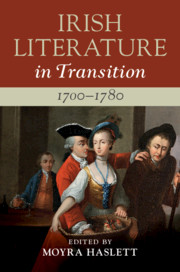Book contents
- Irish Literature in Transition, 1700–1780
- Irish Literature in Transition
- Irish Literature in Transition, 1700–1780
- Copyright page
- Contents
- Illustrations
- Contributors
- Series Preface
- General Acknowledgements
- Introduction
- Part I Starting Points
- Part II Philosophical and Political Frameworks
- Part III Local, National, and Transnational Contexts
- Part IV Gender and Sexuality
- Part V Transcultural Contexts
- Chapter 15 The Popular Criminal Narrative and the Development of the Irish Novel
- Chapter 16 Gaelic Influences and Echoes in the Irish Novel, 1700–1780
- Chapter 17 New Beginning or Bearer of Tradition? Early Irish Fiction and the Construction of the Child
- Part VI Retrospective Readings
- Index
Chapter 16 - Gaelic Influences and Echoes in the Irish Novel, 1700–1780
from Part V - Transcultural Contexts
Published online by Cambridge University Press: 28 February 2020
- Irish Literature in Transition, 1700–1780
- Irish Literature in Transition
- Irish Literature in Transition, 1700–1780
- Copyright page
- Contents
- Illustrations
- Contributors
- Series Preface
- General Acknowledgements
- Introduction
- Part I Starting Points
- Part II Philosophical and Political Frameworks
- Part III Local, National, and Transnational Contexts
- Part IV Gender and Sexuality
- Part V Transcultural Contexts
- Chapter 15 The Popular Criminal Narrative and the Development of the Irish Novel
- Chapter 16 Gaelic Influences and Echoes in the Irish Novel, 1700–1780
- Chapter 17 New Beginning or Bearer of Tradition? Early Irish Fiction and the Construction of the Child
- Part VI Retrospective Readings
- Index
Summary
This essay explores the nature, extent, and significance of Gaelic influences and echoes in a range of Irish novels published between 1700 and 1780. Most Irish novels published in that period were written by Protestants, whose first language was English and many of whom had limited, if any, access to primary sources in the Irish language. In addition, many early Irish novels were published, at least initially, in London and frequently addressed to English readers with little knowledge of, or interest in, Irish history or contemporary affairs. Nevertheless, there are notable exceptions, as some Irish novels - Irish Tales (1716); Gulliver’s Travels (1726); The Life of John Buncle, Esq. (1756); and The Fool of Quality; or, The History of Henry, Earl of Moreland (1765) draw on beliefs and traditions associated with Irish-language culture in ways that illuminate both the diversity and the particularity of early Irish fiction. Direct reference and oblique allusion to Irish history, traditions, and culture within these novels not only facilitated the correction of Anglophone misapprehensions about Ireland and the Irish but also illuminates interactions between the worlds of the Irish-speaking majority and the Protestant elite in eighteenth-century Ireland.
Keywords
- Type
- Chapter
- Information
- Irish Literature in Transition, 1700–1780 , pp. 324 - 342Publisher: Cambridge University PressPrint publication year: 2020



